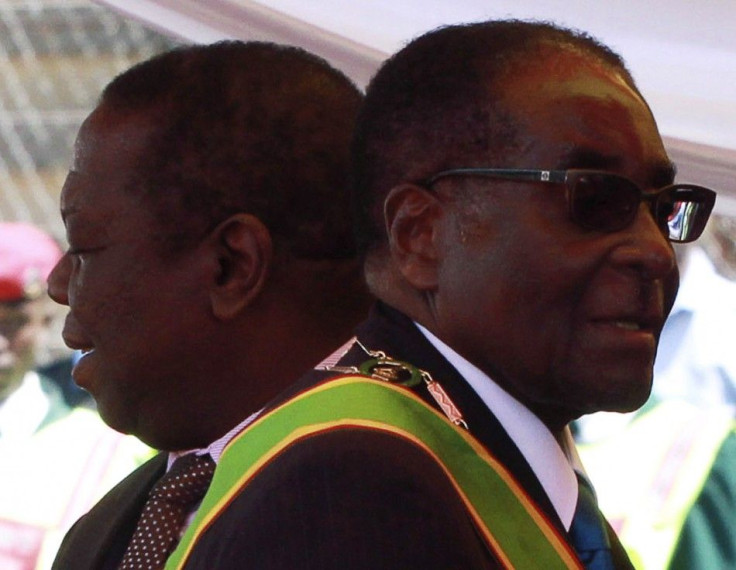The President’s Lies: Why Mugabe Secretly Supports Sanctions On Zimbabwe

If Zimbabwe has a legitimate public referendum on a new constitution, said foreign ministers on Monday, the European Union will suspend most of its sanctions against the southern African nation.
The sanctions began in 2002 as a response to human rights abuses and rigged elections under President Robert Mugabe, a dictatorial strongman who has presided over the nation for more than 30 years. He has failed to translate Zimbabwe's mineral wealth into developmental improvements, and the country suffers unnecessarily high levels of poverty and hunger.
But Mugabe has long blamed his country's travails on Western sanctions, so the EU's decision to lift those sanctions might actually work against him.
A national election is expected to take place next year, and opposition to Western influence has long been a hallmark of Mugabe's campaigns. Without sanctions to condemn, he would be hard-pressed to find something else to blame his country's woes on.
In that scenario, the dictator's democratically minded opponent, current Prime Minister Morgan Tsvangirai, might win an even greater share of public support.
The West Is Watching
Britain's Foreign Secretary William Hague said to the BBC that the decision signified a change in the EU's tactics in dealing with Zimbabwe.
This approach will demonstrate to reformers across the political spectrum that the EU is serious about responding to concrete progress on the ground, he said.
It also puts the onus on the government of Zimbabwe to live up to their commitments. These decisions will be kept under constant review and if the situation deteriorates, we will of course not hesitate to respond appropriately.
That would be bad news for Mugabe, whose government is pervasively corrupt and who is well known for resisting the oversight of Western powers.
Tsvangirai hopes to change that. He leads the Movement for Democratic Change (MDC), which is opposed to Mugabe's party, the Zimbabwe African National Union-Patriotic Front (ZANU-PF). Tsvangirai ran for president against Mugabe in 2008, and the polls had him in the lead. But ZANU-PF waged a campaign of violence and intimidation so that Tsvangirai eventually dropped out, and Mugabe claimed victory. But a subsequent ruling from the Southern African Development Community resulted in a power-sharing arrangement;
Mugabe now acts as president and Tsvangirai as prime minister.
This coalition has proven unbalanced, with Tsvangirai and many MDC members in Parliament often facing harassment by forces loyal to ZANU-PF.
Meanwhile, the population of Zimbabwe is suffering. It has been under ZANU-PF leadership since its independence from Great Britain in 1980, and has made little progress since then. Zimbabwe has plenty of mineral assets, including diamonds, which could be used to finance the public sector and spur development. But reports indicate that these funds are regularly embezzled by ZANU-PF officials.
Put It to a Vote
If his past record is any indication, Mugabe seems unlikely to address his country's problems in any real way. His poor health doesn't help matters; the president is 88 and is rumored to suffer from prostate cancer. There are even reports that he is no longer mentally fit to lead Zimbabwe.
But he seems determined to push ahead with national elections while he still has the strength to endure a campaign season. Should his health deteriorate further, other ZANU-PF strongmen may be in the running to take his place -- most notably former spy chief Emmerson Mnangagwa.
It is against this backdrop that the government is working to draft a new constitution that will allow the country to fashion a new form of government for itself.
A new draft of the constitution was released on Friday; it was generally perceived to be a weak compromise. Under its terms, Mugabe would be allowed to seek another term. The document would also preserve the strong executive role of the president, curtailing its scope only somewhat.
Critics seeking more democratization than this draft provides have vowed to vote down the document in a referendum; the draft may be subject to further changes if reformists get their way.
Meanwhile, there is a governmental push to strengthen alliances with Western powers -- outside of ZANU-PF circles, of course -- and Tsvangirai is trying to present himself as the man leading that charge. He was in Australia on Monday to meet with Prime Minster Julia Gillard, who lauded his efforts to move Zimbabwe forward. And on Friday, Tsvangirai visited Tokyo to participate in a United Nations debate about progress in Africa.
As we prepare for the next election, I urge all of you to support the call for a free and fair election in Zimbabwe in which the people's will is respected and protected. I urge all of you to be ambassadors of democracy, torch bearers for a peaceful environment in our country that will enable citizens to cast their vote without... hindrance, he said, according to The Zimbabwean.
If the EU lifts sanctions and Western powers come to be seen as allies of the Zimbabwean population, Mugabe will watch his popular support weaken even further. In a worst-case scenario, this could motivate him disrupt the constitutional referendum using tactics similar to the ones he employed in the 2008 election, thereby preventing the lifting of sanctions.
But as the opposition grows bolder and enjoys ever-growing international support, holding onto power in his old-fashioned ways may soon become impossible for Zimbabwe's 30-year president.
© Copyright IBTimes 2025. All rights reserved.






















